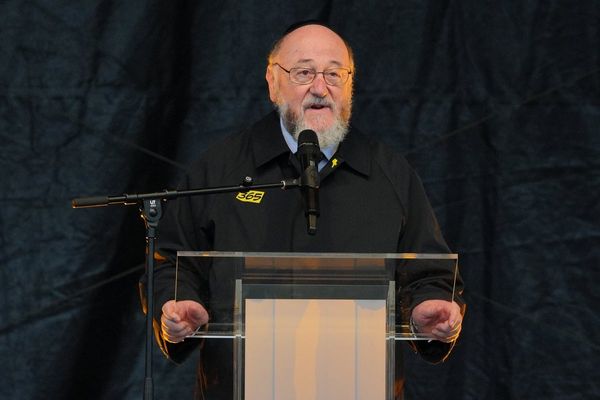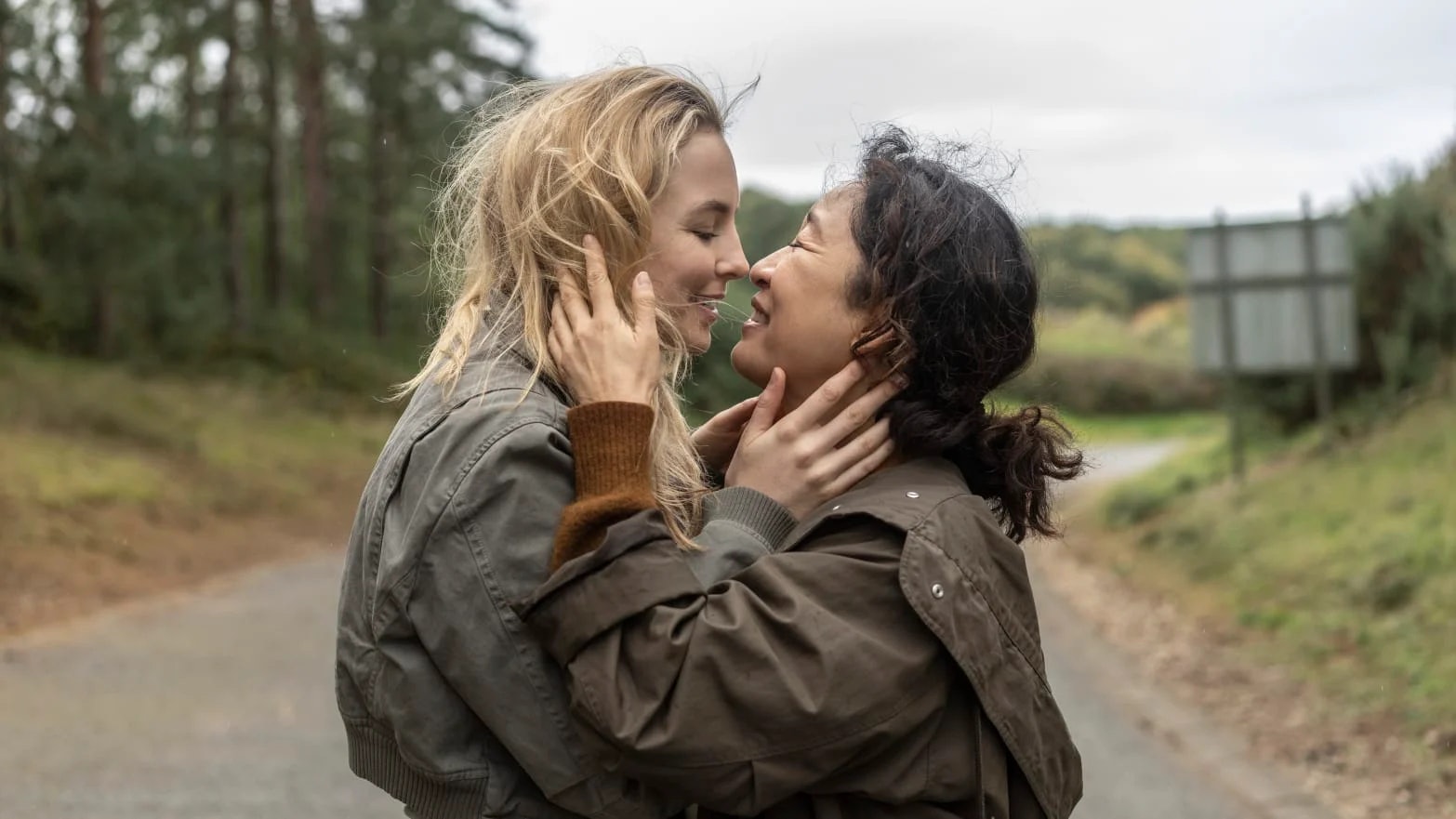
You think about them all the time.
You’ve abandoned your spouse and traveled around the world chasing after them. You left your coworker to die and just hacked a man to pieces with an axe to save their life. So what do you do when they tell you they love you and ask you to run away with them to Alaska?
If you’re Eve Polastri (Sandra Oh), the eponymous MI6 agent of the BBC series Killing Eve, you say no, because the person you’ve completely upended your life for is Villanelle (Jodie Comer), a psychopathic assassin.
And because she’s a psychopathic assassin, she shoots you in the back and leaves you to die under the Italian sun.
Killing Eve is a show about wanting things you’re not supposed to — something LGBTQ pop culture consumers understand at a deep level. And it’s a show that had been seen as groundbreaking in how it didn’t fall prey to the tired tropes that plague stories with queer characters. That is, until its series finale, which definitively squashed fans’ hopes with a brutal conclusion.
So, queer fans are left to do what they’ve always done: fix the ending themselves with the creative power of what drew them to the show in the first place — gay yearning.
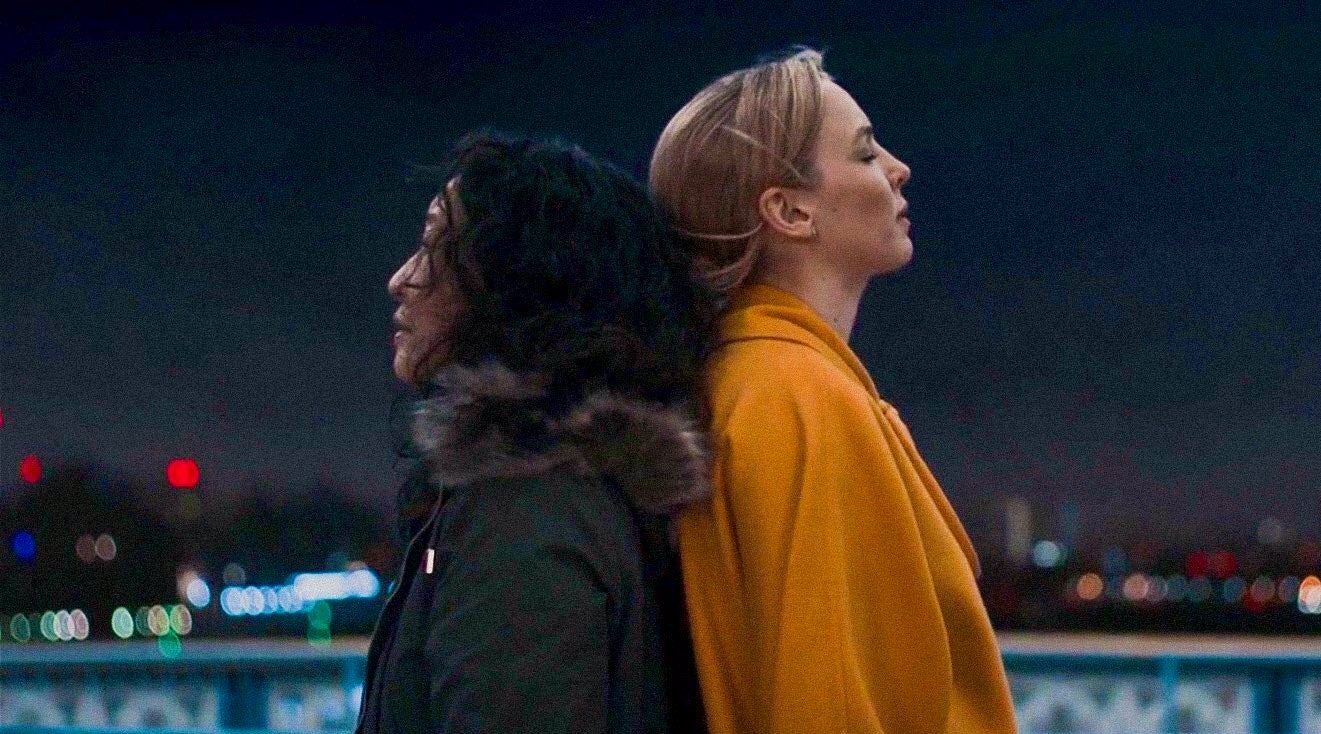
Gay yearning is both the longing for something that is often decidedly gay in flavor and the projection of that longing onto how different characters feel for one another. For fans who can turn horror-thrillers into rom-coms and sitcoms into Greek tragedies, gay yearning is what draws many of them into creative communities — often collectively referred to as fandoms. Fandoms cross platforms, mediums, and genres. They elevate stories, both bad and good, into cult status, allowing them to endure far beyond the last page or a Netflix cancellation.
Gay yearning, however, is distinct from “shipping” — the fandom practice of hoping two characters end up together.
“There are slow-burn stories of two people yearning for each other and having desires and dreams, but it's not yearning in the same way — and for me, it's because the stakes are different,” Chai, a literature student who found refuge in queer books when they were growing up, tells Inverse.
“Your love is already transgressive.”
“When you're queer, the stakes aren't just, Does this person like me or return my feelings? It's not just a romantic context,” Chai adds. “The stakes are your safety. The stakes are your existence. The stakes are the possibility of violence, the possibility of rejection. Your love is already transgressive.”
Like many stories about wanting forbidden things, there was a legion of obstacles standing between Eve and Villanelle and their desires — including an international crime syndicate, the British government, and at least one deadly weapon. But what distinguished Killing Eve from other shows or movies that inspire fanworks (ranging from fanfiction to fanart to fanvids and fanmixes) is that it was explicitly and unabashedly queer. And, for once, that queerness wasn’t an obstacle or what sets them apart from everyone else. It was the most mundane thing about them.
What inspires many of the other fictional works that fans create around pre-existing characters is queer subtext: characters and storylines that could be read as queer or transgender but aren't explicitly acknowledged as such in the show. Fans often excavate queer narratives from works that do not fall into the LGBTQ genre as a way of obtaining representation in mainstream pop culture when it doesn’t otherwise exist.
Killing Eve was exceptional in its portrayal of queerness. But with an ending that has been described as both a betrayal and a slap to the face, many fans are returning to the drawing board to create the stories they want and need to see. Even though fandom is becoming increasingly mainstream, many writers and showrunners continue to fail to understand what drives a large part of their audience.
The Serial Killer “Rom-com”
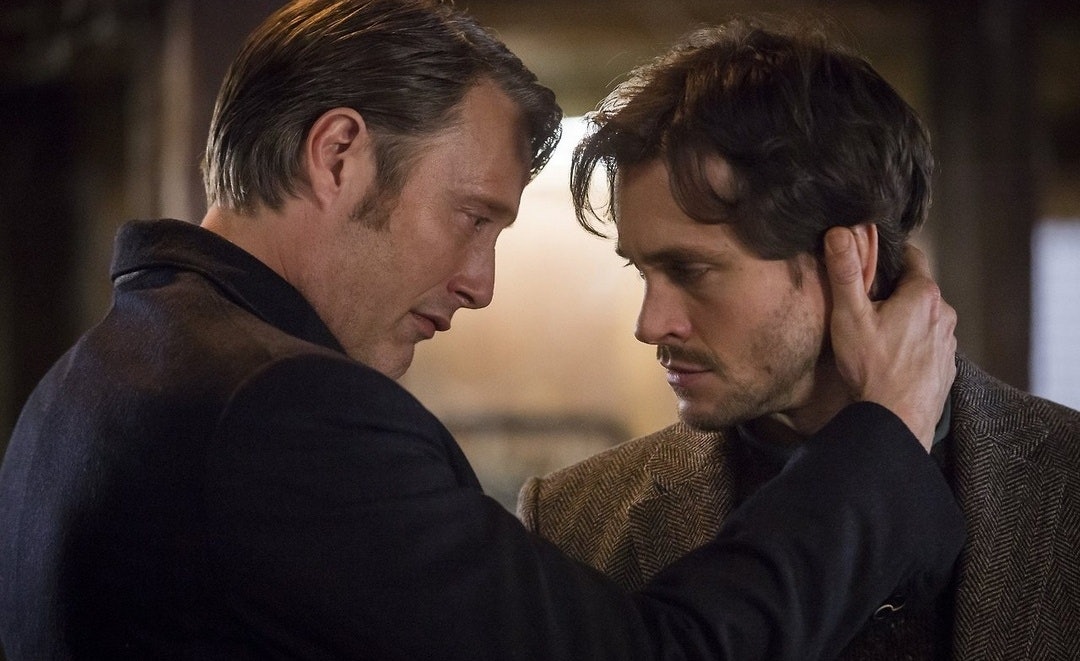
Hannibal, a psychological thriller that ran for three seasons on NBC, is actually a romantic comedy where cannibal psychiatrist Hannibal Lecter (Mads Mikkelson) and empath FBI teacher Will Graham (Hugh Dancy) mutually gaslight each other into falling in love.
At least, that's what fans who are still reinterpreting the show seven years after its final episode aired will tell you. (One teen’s fanart painting of Lecter and Graham even hung in the U.S. Capitol complex in 2021, six years after the final season aired.)
As Tumblr user @doomsayings declared in a December 2021 post, “The Hannibal ending is so fucking good like either they died and its beautiful and gothic or they lived and are now constantly having the most insane and wild animal sex known to man. WHICH, is also beautiful. To me.”
Though the show still retains much of the violence and gruesomeness of its source material, it's also the stuff of Harlequin romances. For fans like Tei, this juxtaposition is part of what makes Hannibal so captivating — and so queer.
“In the context of heterosexual desire, there has to be a very strong dividing line between things that are desirable and things that are revolting,” says Tei, who co-hosts a Hannibal and fandom podcast with two friends and goes by an online username to protect her privacy. “Whereas, historically, in queer spaces and in queer art, you don't need to prove that you're performing your gender and sexuality correctly. The line between desire and disgust can be blurred, and there can be acceptance of the fact that maybe those are actually the same thing.”

Hannibal isn't the only murderous “rom-com” that queer fans are gathering around online.
They’ve also drawn a number of parallels between Hannibal and Venom, a 2018 Marvel film whose 2021 sequel openly acknowledged the romantic undertones between the eponymous alien symbiote and its journalist host — another example, as with Killing Eve, in which the queer subtext fans are used to has been elevated to text.
One popular fan-made Venn diagram suggests semi-jokingly that Hannibal, Venom, and the FX vampire sitcom What We Do In the Shadows all share a “dangerously codependent relationship between a man-eating monster with heightened senses and a weird human man,” “actors on-board with gay agenda,” and “t4t” (a relationship between two transgender people).
The creator of that Venn diagram, Bug, is an artist who first started sharing fanart because of their strong attachment to openly queer characters Rosa Diaz (Stephanie Beatriz) from Brooklyn Nine-Nine and David Rose (Dan Levy) from Schitt's Creek. But while these characters meant a lot to them as a young gay teen, they later found that their wholesome storylines weren't enough.
“Relative to the stuff I enjoy now, Rosa and David are such bland representations of being queer,” Bug says.
“I think there is something about the inhumanity of shows like What We Do In the Shadows, Hannibal, Killing Eve, and Venom that many queer people are drawn to,” they continue. “Obviously the difference between being othered for being gay and being othered for serial killing and cannibalism is huge.”
“The line between desire and disgust can be blurred.”
If media is a mirror, villains and monsters are often the reflections in which queer people see themselves. In shows like Hannibal, characters that read as — or are — queer aren’t forced to repent or redeem themselves (or die) in order to find acceptance and peace.
In a world where queer people are alienated, hunted, and feared, shows that allow anti-protagonists just like them to survive gives queer fans a chance to vicariously transcend even the most hostile of circumstances they face in their own lives.
Some fans are looking for shows where, instead of falling prey to the bury your gays trope and killing off its queer characters, as Tumblr user @bluelonesa put it, “the gays bury everyone else instead.”
And this is happening even though LGBTQ+ representation in mainstream media has increased in the last decade. According to GLAAD, the number of LGBTQ regular or recurring characters in primetime or original scripted series was 2.9 percent in 2011. Add streaming services to the mix with Amazon, Hulu, and Netflix, that percentage jumped to 9.1 in 2020. And in major studio movies, it went from 16.7 percent in 2013 to 22.7 percent in 2020.
But fans like Bug are looking for stories that go beyond being gay in high school, and beyond adding a queer and/or trans character just to fill a quota. They want queer stories that are engaging and meaningful enough to stand on their own.
Often, they are looking for stories that aren't about normalizing queer characters through assimilation, but about those characters’ unabashed refusal to conform.
The Fandom Sweet Spot
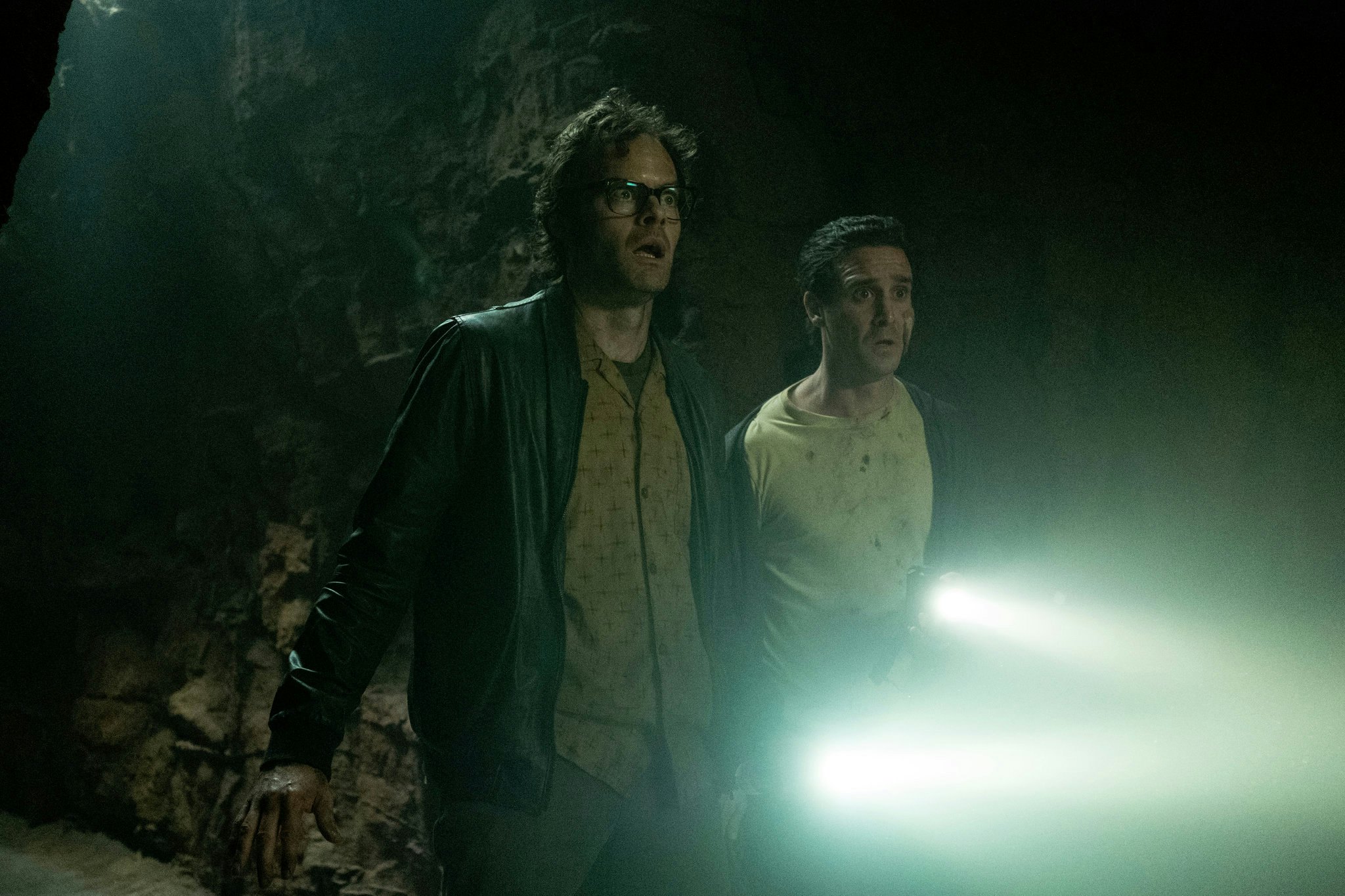
But while some queer fans engage with media like Hannibal as a triumphantly queer romantic comedy by expanding on its storyline, others see the 2019 film It: Chapter Two as a narrative tragedy their fanworks can rectify.
Based on the Stephen King novel, the kids who successfully fought the alien clown in the first rebooted It movie in 2017 reunite as jaded, unhappy adults to fight the clown once again. In a departure from both the novel and the earlier miniseries, it’s revealed to audiences that one of the characters, Richie Tozier (Bill Hader), is both closeted and in love with his childhood best friend, Eddie Kaspbrak (James Ransone). But Richie never actually comes out, and Eddie — who was married to a woman and did not explicitly reciprocate Richie’s feelings — still dies at the end.
“It's tragic in a way that feels familiar because many stories end that way," Sophia a.k.a., mapurlsyrup, tells Inverse. “Not just in the ‘bury your gays’ kind of way, but also in leaving things unsaid to someone you love until it's too late.”
Fans like Sophia wish the movies had done better by the sole LGBTQ character.
“I think so many people are tired of stories that do this, and they just want a happy ending,” she said.
So she fixed it. Sophie programmed a game to “write something new together” with other fans who were also yearning for something else. In her game, which had over 10,000 downloads in the first two weeks of its launch, the character and the player are able to confront their past, save their love, and get the closure they desire. The gang kills the clown again, but this time, Eddie survives and Richie is finally able to tell him how he feels.
Sophia sees both this and her sequel game as odes to fanfiction, where alternate versions of tragic stories like these are possible.
“Sometimes you have a piece of media that's not good, like It. Then you really want to fix it,” she explains.
She references a popular chart by @penny-anna on Tumblr that shows a bell curve of how likely someone is to create fanworks for something. On one end is something so unlikeable and bad that it inspires no fanworks. On the other is something so fantastic that there is nothing to add or change about it. In the middle is the sweet spot: “I love the thing but it needs improvement. I will make many fanworks.”
A Space to Step In

Not every piece of media that's just the right amount of bad or goodwill makes a thriving and productive creative fan community, however. There also needs to be room for fans to step into the narrative.
This, Tei says, could be one reason why so many fanworks center around queer relationships.
“When you have a man and a woman in a room together, the tension between those characters is often cut off early by a romantic or sexual subplot or resolution," she explains.
For queer characters (or those perceived as queer), however, this tension often grows thick enough that even the showrunner’s knife can’t cut it. “It’s telling that the properties people most want to write about are the ones where the relationships seem to have this enormous space in between them that is never quite closed.”
Of course, when creators of a show intentionally preserve this lack of resolution in an are-they-or-aren’t-they-gay pairing to entice a queer audience without ever delivering on its promises, this is considered queerbaiting.
But even queerbaiting doesn't automatically negate the space fans need for generative art.
“I think I've stopped in general caring all that much about what's ‘canon’ and what isn't,” says Bug. “If I think some characters are gay, then I'm right.”
“The most important thing isn't the elements of the story — it's the connection between two human minds.”
“The empowering part of it is that as a marginalized person the world forces this one narrative upon you and, as a defiant act, you come up with new narratives and make those narratives really powerful and sexy and likable,” Chai says. “That subversion and multiplicity of narratives is a huge aspect of queerness.”
Queer representation at all levels of media is important because it expands people's imagination of what's possible in reality. But it's also freeing to not be restricted to what other creators and media executives hand out to you — to be able to create something inspired by a story you see yourself in, regardless of whether that story is intended to include you or not.
“The most important thing isn't the elements of the story — it's the connection between two human minds,” says Tei.
However, with that said, fan communities are not utopias for LGBTQ people, and the media that form the foundations of those communities is far from perfect. Even a show that hits nearly all the marks like Killing Eve can pull the rug out from under you at the very last minute.
But the existence of this space allows fans — and especially queer fans — to redefine what is worthy of attention and care, and what is good enough to bring to existence and share with others.
And there is no need to wait, beg, or seek permission to bring these stories to life. As trans writer Gretchen Felker-Martin said in a tweet, “Your peers, not multinational media conglomerates, are making the art your hearts are so hungry for.”
You just have to know where to find it — or create it yourself.

